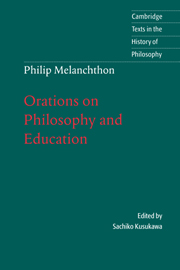Book contents
- Frontmatter
- Contents
- Acknowledgements
- Introduction
- Chronology
- Further reading
- Note on the text
- The scope of education
- The arts course
- 4 On the study of languages
- 5 Preface to Homer
- 6 On the usefulness of fables
- 7 Praise of eloquence
- 8 Preface to Cicero's On Duties
- 9 Dedicatory letter to the Questions on Dialectics
- 10 Preface to arithemetic
- 11 Preface to geometry
- 12 Preface to On the Sphere
- 13 On astronomy and geography
- 14 The dignity of astrology
- 15 On philosophy
- 16 On natural philosophy
- 17 Dedicatory letter to the Epitome of Moral Philosophy
- 18 Preface to the Commentary on the Soul
- 19 Preface to the Book on the Soul
- 20 On anatomy
- The higher faculties
- Authorities
- Index
- Cambridge texts in the history of philosophy
14 - The dignity of astrology
Published online by Cambridge University Press: 05 June 2012
- Frontmatter
- Contents
- Acknowledgements
- Introduction
- Chronology
- Further reading
- Note on the text
- The scope of education
- The arts course
- 4 On the study of languages
- 5 Preface to Homer
- 6 On the usefulness of fables
- 7 Praise of eloquence
- 8 Preface to Cicero's On Duties
- 9 Dedicatory letter to the Questions on Dialectics
- 10 Preface to arithemetic
- 11 Preface to geometry
- 12 Preface to On the Sphere
- 13 On astronomy and geography
- 14 The dignity of astrology
- 15 On philosophy
- 16 On natural philosophy
- 17 Dedicatory letter to the Epitome of Moral Philosophy
- 18 Preface to the Commentary on the Soul
- 19 Preface to the Book on the Soul
- 20 On anatomy
- The higher faculties
- Authorities
- Index
- Cambridge texts in the history of philosophy
Summary
Oration on the dignity of astrology, held at the graduation of Masters by Jacob Milich, in the year 1535
It is an excellent institution when on these occasions someone speaks about the dignity of the arts and about the praise of virtues, because that oration has great power to shape the judgement of the young and to kindle in their minds the love of good things. Even if it is usually mainly for the benefit of the young that an oration is employed here, nevertheless for others no other gratification to the ear is more pleasant than the praises of the arts and the virtues; if anyone understands them, he will therefore admire them ardently. Thus, even if our oration will be more appropriate for the young, I am assured nevertheless that it will not be disagreeable to you either; the greater your erudition and sagacity, the more I believe you will be delighted by the very thought of the arts. I shall speak of that part of astrology that discusses the effects of the constellations on sublunar nature – and I have chosen this topic even more willingly, because I am aware that it needs to be discussed among learned men dedicated to philosophy, and not in the crowd of the inexperienced. Just as the Greek orators said with great sagacity in the definition of art that art not only needs to be true knowledge, but they added also that it needs to be useful for life, so I shall show both that the science of heavenly influences is true and that it brings great benefits for life.
- Type
- Chapter
- Information
- Melanchthon: Orations on Philosophy and Education , pp. 120 - 125Publisher: Cambridge University PressPrint publication year: 1999



